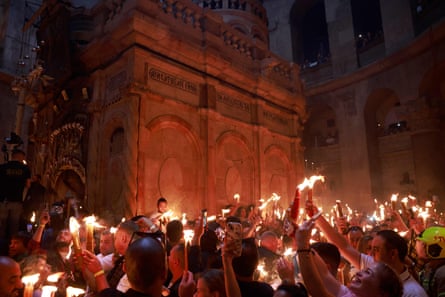Thousands of Christians in Jerusalem have celebrated the traditional Holy Fire rite ahead of the Orthodox Easter, despite a security clampdown limiting access to their most holy site.
The ancient Church of the Holy Sepulchre, where the thousand-year-old rite takes place, was built over the site where Christian tradition says Jesus Christ was crucified, buried and resurrected.
The church is in Israeli-annexed East Jerusalem, and for the second consecutive year Israeli police had told church leaders access would be considerably restricted.
In the past about 10,000 worshippers would fill the church for the ceremony, with many more crowding outside, but this year Israeli police limited attendance inside the church to 1,800 people, including 200 police officers.
Thousands of Palestinian worshippers and foreign pilgrims also gathered in the square outside the church, in adjacent streets and outside the walls of the Old City on Saturday.

The ceremony sees a flame – which the faithful believe sparks miraculously each year – brought from the tomb and passed via candles among worshippers. It marks the most important event in the Orthodox calendar.
Theophilus III, the Greek Orthodox Patriarch of Jerusalem, emerged shortly before 3pm local time on Saturday, bearing two bundles of lighted candles. Cries of joy, cheers and singing broke out as the flame was passed between believers.
Police say the restrictions are intended to ensure safety after 44 people were killed in a crowd crush at a Jewish religious gathering in 2021.
But many Palestinian Christians say restrictions are proof of discrimination against them.
Ahmad Tibi, an Arab-Israeli member of parliament, said on Saturday: “All Palestinians in East Jerusalem, Muslims and Christians, are suffering from the occupation. We must do more to end these restrictions, violations and police violence.”
Police spokesperson Dean Elsdunne said the police “want a lot of people to be able to come, but our number one priority is human life”.
This year’s ceremony also comes after deadly attacks and clashes in Israel, East Jerusalem and the occupied West Bank, as well as ongoing protests against a controversial government judicial overhaul.
Late on Saturday thousands of Israelis took to the streets of Tel Aviv for a 15th consecutive week of protests against the changes, which were paused by the prime minister, Benjamin Netanyahu, on 27 March to allow for continued dialogue.
Israeli media reported tens of thousands had turned out, while smaller protests also took place in the northern port of Haifa and outside the home of the justice minister, Yariv Levin.
The government’s proposals would curtail the authority of the supreme court and give politicians greater powers over the selection of judges.
Netanyahu’s government – a coalition between his Likud party and extreme-right and ultra-Orthodox Jewish allies – has seen its popularity hit in recent polling,

 1 year ago
59
1 year ago
59










 English (US)
English (US)